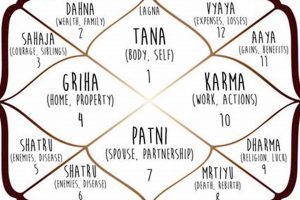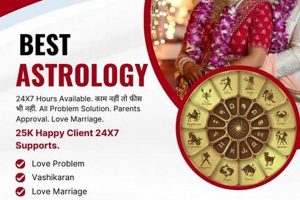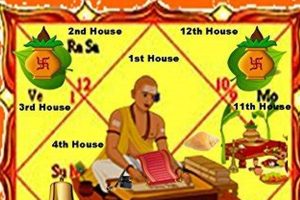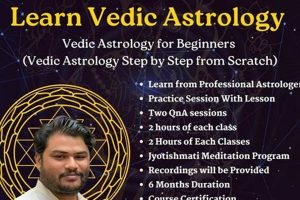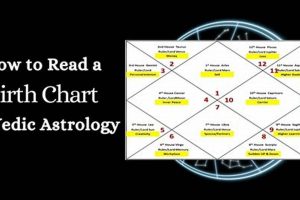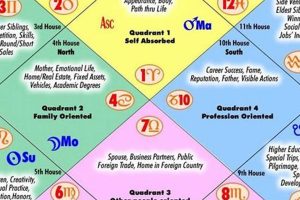Matching horoscopes, a practice rooted in ancient Indian tradition, assesses compatibility for a prospective marital union. This analysis considers planetary positions at birth, Nakshatras (lunar mansions), and other astrological details to determine potential harmony and challenges within the relationship. A typical consultation might involve examining specific charts for indications of marital bliss, longevity, progeny, and overall compatibility.
This practice offers individuals insight into the dynamics of a potential partnership, providing a framework for understanding strengths, weaknesses, and potential areas of growth. Historically, this astrological assessment played a crucial role in arranged marriages, providing families with a tool for evaluating suitability beyond social considerations. While societal norms have evolved, its significance endures as a means of fostering self-awareness and gaining a deeper understanding of relational dynamics within marriage.
Further exploration will delve into the core components of this astrological methodology, including the specific elements considered and their interpretation within the context of a marital relationship. This analysis will also address common misconceptions and limitations, offering a balanced perspective on its utility in contemporary life.
Consulting an astrologer regarding marriage can provide valuable insights. These tips offer guidance for approaching this process thoughtfully and effectively.
Tip 1: Approach with an Open Mind, Not as a Definitive Answer: Astrological guidance should be viewed as one of several factors to consider, not a deterministic prediction. Use insights gained to enhance self-awareness and understanding, not as a rigid roadmap.
Tip 2: Provide Accurate Birth Details: Accurate birth time, date, and location are crucial for accurate chart generation and interpretation. Inaccuracies can significantly skew results.
Tip 3: Consult Experienced and Reputable Astrologers: Seek practitioners with proven expertise and ethical conduct. Thorough research and recommendations are advisable.
Tip 4: Focus on Understanding, Not Just Predictions: Engage in a dialogue with the astrologer to understand the reasoning behind their interpretations. This fosters personal growth and informed decision-making.
Tip 5: Consider Both Individual and Combined Charts: Analyze individual natal charts to understand personal strengths and weaknesses, then examine the combined chart for insights into relational dynamics.
Tip 6: Don’t Solely Rely on Astrological Compatibility: While astrological insights are valuable, remember that compatibility encompasses emotional intelligence, shared values, and effective communication.
Tip 7: Integrate Insights with Practical Considerations: Balance astrological guidance with practical considerations such as lifestyle compatibility, long-term goals, and emotional connection.
Following these guidelines can help individuals utilize astrological guidance effectively, promoting a more holistic approach to evaluating marital prospects and fostering a deeper understanding of relational dynamics.
By combining astrological insight with practical considerations, individuals can approach marriage with greater awareness and a foundation for building a strong, fulfilling partnership.
1. Birth Chart Analysis
Birth chart analysis forms the cornerstone of Vedic astrology marriage prediction. It provides a personalized cosmic blueprint based on the precise time, date, and location of an individual’s birth. This chart serves as the foundation for understanding individual characteristics and potential marital dynamics.
- Planetary Placements in Houses:
The positioning of planets within the twelve astrological houses signifies different life areas. For example, the seventh house governs partnerships and marriage. A benefic planet like Jupiter in the seventh house can suggest a harmonious and prosperous marriage, while a malefic planet like Saturn might indicate delays or challenges. Analyzing planetary placements offers insights into the potential nature of the marital relationship.
- Interplay of Planets:
Planetary relationships, or aspects, significantly impact marital dynamics. Beneficial aspects between Venus and Mars, for instance, can indicate passion and attraction, while challenging aspects between Mars and Saturn might suggest conflict and tension. Understanding these interplanetary relationships provides a nuanced view of potential compatibility.
- Influence of the Navamsa Chart:
The Navamsa chart, a divisional chart used in Vedic astrology, provides a deeper understanding of the marital relationship. It reveals the strength of planets and their influence on married life. Analyzing the Navamsa chart can offer insights into the overall quality and longevity of the marriage.
- Role of the Seventh Lord:
The planet ruling the seventh house, known as the seventh lord, plays a crucial role in marital affairs. The placement and strength of this planet can significantly influence the nature of the partnership. A well-placed seventh lord can indicate a supportive and loving spouse, while a debilitated seventh lord might suggest challenges in finding or maintaining a harmonious marriage.
By meticulously examining these facets of a birth chart, Vedic astrologers gain valuable insights into an individual’s marital potential. These astrological insights, when combined with practical considerations, empower individuals to make informed decisions and navigate the complexities of relationships with greater awareness.
2. Planetary Positions
Planetary positions at the time of birth are fundamental to Vedic astrology marriage prediction. These celestial placements influence individual characteristics and relationship dynamics. Analyzing these positions provides insights into potential compatibility, challenges, and overall marital harmony.
- Venus’s Influence:
Venus signifies love, relationships, and harmony. Its placement within the birth chart reveals an individual’s approach to romance and partnership. A strong and well-placed Venus can indicate a loving and affectionate disposition, contributing to a harmonious marriage. Conversely, a debilitated or afflicted Venus might suggest challenges in expressing affection or maintaining stability in relationships.
- Mars and Marital Harmony:
Mars represents energy, passion, and assertiveness. Its placement can influence the level of passion and conflict within a marriage. A favorably placed Mars can contribute to a dynamic and energetic partnership. However, an afflicted Mars might indicate a tendency towards aggression or dominance, potentially leading to marital discord.
- Jupiter’s Role in Marriage:
Jupiter signifies wisdom, expansion, and good fortune. Its placement can indicate the potential for growth and harmony within a marriage. A strong Jupiter often suggests a supportive and understanding partner, promoting stability and mutual respect within the relationship.
- Saturn and Marital Longevity:
Saturn represents discipline, responsibility, and longevity. Its placement can influence the duration and stability of a marriage. While a well-placed Saturn can contribute to a long-lasting and committed partnership, an afflicted Saturn may indicate delays in marriage or challenges in maintaining long-term commitment.
Analyzing these key planetary positions provides valuable insights into potential marital dynamics. By considering the combined influence of these planets, Vedic astrologers offer guidance on navigating the complexities of relationships and building a strong foundation for a successful marriage.
3. Nakshatra Matching
Nakshatra matching, also known as Ashtakoot Milan, is a crucial component of Vedic astrology marriage prediction. It assesses compatibility based on the lunar constellations (Nakshatras) in which the bride and groom were born. This analysis provides insights into the potential harmony and longevity of the marital relationship, considering various factors beyond planetary placements.
- Nadi Harmony:
Nadi, representing physiological and hereditary factors, holds significant weight in Nakshatra matching. Compatibility in Nadi is considered essential for progeny and overall well-being. Three Nadi types exist: Vata, Pitta, and Kapha. Matching Nadis are traditionally avoided due to potential health concerns for offspring, while different Nadis are considered more auspicious. This facet reflects the emphasis on physical and genetic compatibility within Vedic astrology.
- Vasya and Power Dynamics:
Vasya assesses the potential power dynamics within the relationship. It indicates who might exert more influence within the partnership. Different Vasya combinations suggest varying levels of dominance and submission between partners. Understanding Vasya can help anticipate potential power imbalances and facilitate more balanced communication within the marriage.
- Tara and Overall Wellbeing:
Tara assesses the overall well-being and prosperity of the couple. It examines the potential for mutual support and growth within the relationship. Favorable Tara combinations indicate a supportive and nurturing partnership, fostering individual growth and shared success. This facet highlights the importance of mutual support and encouragement within a successful marriage.
- Yoni and Sexual Compatibility:
Yoni assesses sexual compatibility and procreative potential. It symbolizes animal archetypes associated with each Nakshatra, providing insights into the couple’s intimate dynamics. Compatibility in Yoni suggests a harmonious and fulfilling sexual relationship, contributing to the overall strength and longevity of the marriage. While sometimes viewed as a sensitive topic, understanding Yoni can facilitate open communication about intimacy within the relationship.
These key facets of Nakshatra matching provide a comprehensive view of compatibility beyond basic planetary influences. By considering these elements alongside other astrological factors, Vedic astrology offers a nuanced understanding of potential marital dynamics, enabling individuals to approach marriage with greater awareness and insight. While not solely deterministic, Nakshatra matching provides a valuable framework for understanding the complexities of relationships and building a strong foundation for a successful marriage.
4. Ashtaka Varga
Ashtaka Varga, a unique system within Vedic astrology, provides a nuanced perspective on planetary strengths and weaknesses across different life areas, including marriage. This system assigns points to each planet based on its placement in various signs and houses, creating a composite chart that reveals auspicious and challenging periods for specific life events. In the context of marriage prediction, Ashtaka Varga helps assess the overall strength of the seventh house (marriage and partnerships) and the planets influencing it. A high Ashtaka Varga score for the seventh house generally suggests a favorable period for marriage, indicating potential harmony and stability. Conversely, a low score might indicate challenges or delays in finding a suitable partner or maintaining marital bliss. For example, if Venus, the significator of love and relationships, has a high Ashtaka Varga score in the seventh house, it strengthens the prospects of a harmonious and fulfilling marriage.
Furthermore, Ashtaka Varga can pinpoint specific periods within an individual’s life that are more conducive to marriage. This system analyzes planetary transits and their interaction with the individual’s Ashtaka Varga chart to identify favorable timings for marriage ceremonies and the commencement of married life. For instance, a transit of Jupiter through a sign with a high Ashtaka Varga score for the seventh house can be considered an auspicious time for marriage. This detailed analysis of planetary strengths contributes significantly to the precision of marriage prediction, allowing astrologers to offer more specific guidance. Understanding the influence of Ashtaka Varga empowers individuals to make informed decisions regarding the timing and prospects of their marriage.
In essence, Ashtaka Varga serves as a valuable tool for refining marriage predictions within Vedic astrology. Its intricate analysis of planetary strengths and weaknesses offers a deeper understanding of the potential challenges and opportunities surrounding marriage. By considering the Ashtaka Varga scores along with other astrological factors, practitioners can provide more accurate and personalized guidance, enabling individuals to approach marriage with greater awareness and preparation. While Ashtaka Varga offers valuable insight, it is essential to remember that it’s one component of a holistic astrological analysis. Other factors, including planetary placements, Nakshatra compatibility, and individual choices, play equally crucial roles in shaping the course of a marriage.
5. Mangal Dosha Assessment
Mangal Dosha, often referred to as “Kuja Dosha,” is a significant consideration in Vedic astrology marriage prediction. This astrological condition arises when Mars (Mangal) is placed in specific houses (1st, 2nd, 4th, 7th, 8th, or 12th) in an individual’s birth chart. The presence of Mangal Dosha is believed to potentially create challenges in marital life, such as discord, conflict, and even separation. Its assessment, therefore, becomes crucial in evaluating marital compatibility. The intensity of Mangal Dosha varies depending on the specific house placement of Mars and its aspects with other planets. For instance, Mars in the 7th house is considered to have a more pronounced impact on marital harmony than Mars in the 2nd house. Traditional astrological texts suggest that matching two individuals with Mangal Dosha can neutralize its negative effects, although this view is debated among contemporary practitioners. Regardless, understanding the presence and nature of Mangal Dosha in both partners’ charts provides valuable insights into potential areas of friction and allows for proactive measures to mitigate challenges.
Practical implications of Mangal Dosha assessment are substantial. While not a definitive predictor of marital failure, its presence encourages careful examination of other compatibility factors. A thorough analysis considers the strength of Mars, its aspects, and the overall planetary configuration. For example, a strong and well-aspected Mars, even in a Dosha-causing house, might have a less detrimental impact. Remedial measures, such as specific rituals or gemstone recommendations, are often suggested to mitigate the perceived negative effects. Moreover, understanding the potential influence of Mangal Dosha can encourage couples to develop strategies for managing conflict and fostering effective communication. It promotes self-awareness and encourages proactive steps towards building a stronger and more resilient relationship.
In summary, Mangal Dosha assessment remains an integral part of Vedic astrology marriage prediction. Its presence necessitates careful analysis and consideration within the broader context of compatibility assessment. While it can indicate potential marital challenges, it is not a deterministic factor. By understanding its nuances and adopting a balanced approach, individuals can gain valuable insights and take proactive steps to build fulfilling and harmonious relationships.
6. Dasha Analysis
Dasha analysis plays a crucial role in Vedic astrology marriage prediction by providing a timeline for potential life events, including marriage. Planetary periods, known as Dashas, exert a significant influence on an individual’s experiences. Analyzing these periods helps determine favorable timings for marriage and potential challenges during specific phases. Each Dasha is associated with a particular planet, and its influence reflects the characteristics of that planet. For instance, a Venus Dasha often signifies a period conducive to relationships and marriage, while a Mars Dasha might bring energy and passion but also potential conflict. The interplay of these Dashas within an individual’s life, combined with their birth chart and other astrological factors, provides a nuanced understanding of the timing and potential nature of marital events. Consider, for example, an individual with a favorably placed Venus in their birth chart. If their Venus Dasha coincides with other supportive planetary transits, it significantly increases the likelihood of marriage during that period. Conversely, even with a promising birth chart, a challenging Dasha period might create obstacles or delays in marriage.
Practical implications of Dasha analysis are far-reaching. It offers valuable guidance regarding the optimal timing for marriage ceremonies and helps individuals anticipate potential challenges during specific phases of their married life. Understanding the influence of ongoing Dashas can empower couples to navigate potential difficulties more effectively. For instance, if a couple is aware of an upcoming challenging period, they can take proactive steps to mitigate potential conflict and strengthen their relationship. Furthermore, Dasha analysis aids in understanding the overall trajectory of married life, providing insight into periods of growth, harmony, and potential challenges. It enables individuals to approach marriage with greater awareness and preparedness, allowing for more informed decision-making.
In summary, Dasha analysis provides a crucial temporal dimension to Vedic astrology marriage prediction. By understanding the influence of planetary periods, individuals gain valuable insights into the timing and potential dynamics of their marital journey. This understanding empowers them to make informed choices, navigate challenges effectively, and build a strong foundation for a fulfilling and lasting partnership. While Dasha analysis offers valuable foresight, it is essential to remember that it functions within the larger framework of a comprehensive astrological analysis. Other factors, including birth chart placements, Nakshatra compatibility, and individual choices, play equally crucial roles in shaping the course of a marriage.
7. Remedial Measures
Vedic astrology often suggests remedial measures to mitigate potential challenges indicated in a marriage prediction. These measures aim to harmonize planetary influences and enhance the prospects of a successful and fulfilling partnership. They are not a guaranteed solution but rather a supportive practice to address specific astrological imbalances.
- Gemstone Therapy:
Specific gemstones are recommended based on planetary positions to strengthen beneficial influences and mitigate negative ones. For example, wearing a yellow sapphire can strengthen Jupiter, enhancing wisdom and harmony in marriage, while a red coral can mitigate the negative effects of Mars, reducing potential conflict. Gemstone recommendations are personalized based on individual birth charts.
- Mantra Recitation:
Chanting specific mantras associated with particular deities or planets is believed to invoke positive energies and alleviate astrological afflictions. For instance, chanting the mantra for Goddess Parvati can enhance marital bliss, while chanting mantras for Mars can pacify its negative influence. The prescribed mantras and method of chanting are often personalized based on the specific astrological imbalances identified.
- Charitable Acts and Rituals:
Performing specific charitable acts or rituals, such as donating food or clothing, or participating in religious ceremonies, is believed to generate positive karma and mitigate negative planetary influences. Donating to a cow shelter, for example, is considered auspicious for mitigating the effects of Ketu, while fasting on specific days can appease certain planetary deities. The choice of charity or ritual depends on the specific astrological situation.
- Lifestyle Adjustments:
Sometimes, remedial measures involve lifestyle adjustments, such as adopting specific dietary habits or practicing meditation and yoga. These adjustments aim to enhance overall well-being and create a more balanced and harmonious life, indirectly supporting marital happiness. Adopting a vegetarian diet, for instance, is often recommended for individuals with a strong influence of Saturn, promoting discipline and stability. These lifestyle changes are complementary to other remedial measures.
These remedial measures, while not mandatory, offer a proactive approach to addressing potential challenges identified through Vedic astrology marriage prediction. They provide a framework for individuals to engage in practices believed to enhance marital harmony and mitigate potential difficulties. It’s crucial to remember that these measures are not a substitute for open communication, mutual respect, and shared effort in building a successful and fulfilling marriage. They are best viewed as supportive tools within a broader context of personal growth and relational development.
Frequently Asked Questions
This section addresses common inquiries regarding the application of Vedic astrology to marriage prediction.
Question 1: How accurate are Vedic astrology marriage predictions?
Accuracy depends on multiple factors, including the astrologer’s expertise, the accuracy of birth details, and individual free will. Predictions offer potential outcomes, not deterministic pronouncements. They serve as guides, not definitive answers.
Question 2: Can Vedic astrology guarantee a successful marriage?
No astrological system can guarantee outcomes. Predictions offer insights into potential strengths and weaknesses within a relationship. Success depends on mutual effort, understanding, and adaptability. Astrology serves as a tool for self-awareness, not a guarantee of success.
Question 3: What if birth details are unknown or uncertain?
Accurate birth time is crucial for precise predictions. Rectification techniques can sometimes be applied, but accuracy diminishes. Consultations can still provide valuable insights even with estimated birth times, focusing on broader life themes rather than specific event timing.
Question 4: Can Vedic astrology predict the timing of marriage?
Planetary periods (Dashas) and transits provide insight into potential timings. However, precise prediction is complex. Astrology offers probable periods rather than fixed dates, acknowledging the influence of individual choices and external circumstances.
Question 5: Should one reject a potential partner solely based on astrological incompatibility?
Astrological compatibility is one factor among many. Dismissing a potential partner solely on astrological grounds is inadvisable. Emotional connection, shared values, and life goals are equally crucial. Astrology provides insights, not dictates.
Question 6: What if predictions indicate potential challenges in marriage?
Challenges are not insurmountable. Vedic astrology offers remedial measures and guidance to mitigate potential issues. Predictions offer awareness, empowering individuals to address challenges proactively. Open communication and mutual understanding are essential for navigating difficulties.
Ultimately, Vedic astrology provides a framework for understanding potential marital dynamics. It encourages thoughtful reflection and informed decision-making. Its value lies in promoting self-awareness and providing a nuanced perspective on relationships, not in offering definitive pronouncements.
Further exploration of specific astrological concepts and their application to marriage prediction can provide deeper understanding.
Conclusion
Exploration of Vedic astrology’s application to marriage prediction reveals a complex system interwoven with cultural and historical significance. Analysis of birth charts, planetary positions, Nakshatras, Ashtaka Varga, Mangal Dosha, and Dashas provides a framework for understanding potential marital dynamics. Remedial measures offer potential avenues for mitigating perceived challenges. While not deterministic, these astrological tools offer valuable insights into potential strengths, weaknesses, and opportunities within a prospective partnership. Understanding these elements allows individuals to approach marriage with greater awareness.
The significance of Vedic astrology in marriage prediction extends beyond mere compatibility assessment. It encourages self-reflection, promotes open communication, and fosters a deeper understanding of relational dynamics. While astrological insights can be valuable, responsible application necessitates acknowledging limitations and prioritizing individual agency. Marriage, a complex interplay of individual choices and external influences, requires continuous effort, understanding, and mutual respect. Astrology serves as a guide, not a guarantee, empowering individuals to navigate the complexities of relationships with greater awareness and informed decision-making.


